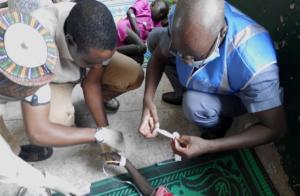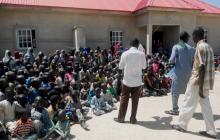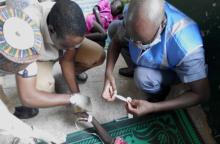Cholera Outbreak - Borno State Commissioner for Health applauds WHO for coordinating early response
Maiduguri, 24 September, 2015 - The Borno State Commissioner for Health, Dr. Haruna Mshelia has commended the World Health Organization for coordinating early response to the cholera outbreak reported in the internally displaced persons’ (IDPs) camps in Maiduguri the state capital during the 37th epidemiological week.
Dr Mshelia made the commendation during a visit to one of the treatment centers in Maiduguri, the state capital to assess the on-going efforts to contain the disease on 23 September, 2014. He also expressed gratitude to Federal government agencies and other partners including the National Emergency Management Agency, Nigeria Centre for Disease for Disease Control, UNICEF, MSF, OXFAM, ICRC and RUWAAS for assisting the state and encouraged them to sustain the good work as well as keep the situation under control and forestall further occurrence.
“WHO’s leadership role in surveillance and active search for cases, coordination of the response activities, including clinicians’ sensitization on diarrheal diseases and infection prevention and control were some of the measures that have been effective in the control of the cholera outbreak in the state” Dr Mshelia stated.
Speaking further, the Commissioner disclosed that on its part, the state has carried out some emergency measures which included the closure of a reservoir in Goni Kachallari camp which led to drastic reduction in the number of reported cases.
As of 24 September 2015, a total of 408 cases with 13 deaths and a case fatality rate of 3.2% had been reported. Cases are reported from four IDP camps and the surrounding communities with cases in the communities accounted for 18% of the total reported cases. Following support from WHO to the national and state health authorities to coordinate a robust outbreak response, the number of cases has been on a steady decline. Only 15 cases were reported on 24 September 2015, which shows an improvement compared to 51 cases that were reported on 9 September 2015.
Further reduction is anticipated in the days to come as appropriate treatment and response activities have commenced in earnest by government, supported by WHO and partners through the establishment of a cholera treatment center, training of clinicians on case management, provision of medicines and supplies and community sensitization.
The WHO Disease Control and Prevention advisor in Nigeria Dr Mary Stephen explained that in these camps, “the most likely source of infection was contamination of water with fecal matter following heavy rainfall leading to overflow of sewage, poor personal and environmental hygiene and inadequate water supply”. She added that “overcrowding and poor environmental conditions worsened these conditions”.
It could be recalled that on 07 September 2015 the Borno State Ministry of Health (SMOH) received reports of diarrhea and vomiting from Sanda Kyarimi community IDP camp in Jere LGA of Borno state. The index case was a 30 year old woman and two of her children and three days later, the outbreak spread to Goni Kachallari camp.
Stool samples taken tested positive for Vibrio cholera, type O139, using the rapid diagnostic cholera test kit. The cases increased sharply and spread to two other contiguous IDP camps in the state. Ten days later, other communities in Maiduguri began to report suspected cases of cholera.
Other activities conducted by WHO included training of disease surveillance and disease notification officers and WHO local government area facilitators with mandate to conducted contact tracing of the cases in the community including identification and mitigation of risk factors.
Furthermore, camp coordinators were trained to improve their knowledge and skills on early detection, reporting and response and establishment of situation room for coordination and feedback.
Despite these efforts, there are some gaps that needed to be bridged by both the SMOH and partners. These include the need to continue with community health education, especially in affected areas on improvement of food hygiene, hand washing and sanitation, provision of medicines and supplies as well as reduction in overcrowding and early reporting.
______________________________________
For more information, please contact:
Technical contacts:
Dr Mary Stephen; Tel: +234 816 289 9789; Email: stephenm [at] who.inttarget="_blank"
Dr Saidu Mahmood; Tel: +234 803 6 12 5696; Email: saidum [at] who.int
Media contact:
Ms Charity Warigon; Tel: +234 810 221 0093; Email: warigonc [at] who.inttarget="_blank"






